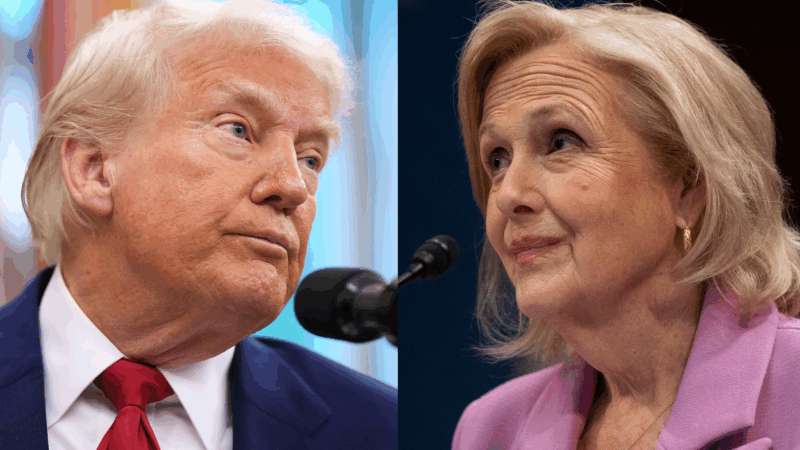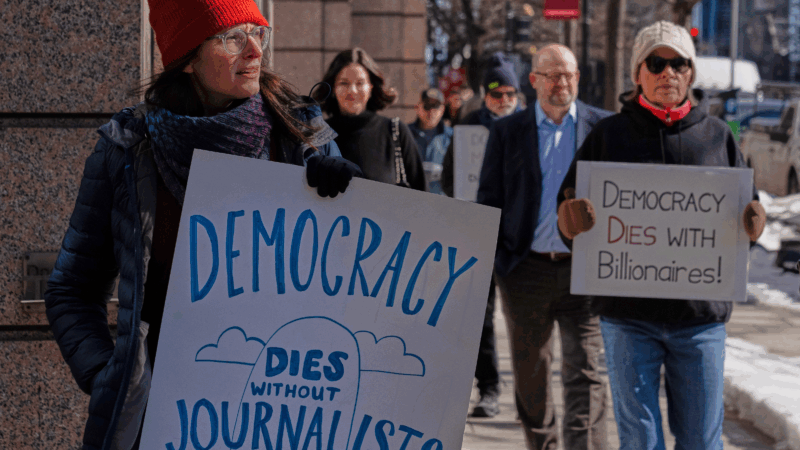PBS and Minnesota public TV station sue Trump White House
PBS and a public television station in rural Minnesota filed suit on Friday against President Trump over his executive order demanding that the Corporation for Public Broadcasting kill all funding for the network.
The suit alleges Trump’s order is unlawful, exceeding his authority as president and violating Constitutional protections of free speech because he has made clear he doesn’t like PBS’s news coverage and programming.
“This action challenges an unprecedented presidential directive attacking PBS and its member stations… in a manner that will upend public television,” the lawsuit states.
It continues: “The EO makes no attempt to hide the fact that it is cutting off the flow of funds to PBS because of the content of PBS programming and out of a desire to alter the content of speech. That is blatant viewpoint discrimination and an infringement of PBS and PBS Member Stations’ private editorial discretion.”
PBS President and CEO Paula Kerger declined comment Friday.
In a statement, the network said, “After careful deliberation, PBS reached the conclusion that it was necessary to take legal action to safeguard public television’s editorial independence, and to protect the autonomy of PBS member stations.”
The White House did not immediately have a comment about the suit.
Trump’s executive order accuses NPR and PBS of failing to provide “fair, accurate, unbiased and nonpartisan news.” He asserts that there are plenty of media options for people to choose from nowadays.
“Government funding of news media in this environment is not only outdated and unnecessary but corrosive to the appearance of journalistic independence,” the order states. It bans CPB from sending any money to PBS and NPR, and bars local stations from sending the networks any federal money.
On social media platforms, Trump has blasted the networks in capital letters: “REPUBLICANS MUST DEFUND AND TOTALLY DISASSOCIATE THEMSELVES FROM NPR & PBS, THE RADICAL LEFT ‘MONSTERS’ THAT SO BADLY HURT OUR COUNTRY!”
The two networks reject that characterization.
Beyond that, the lawsuit filed by PBS and Minnesota affiliate Lakeland PBS argues, “regardless of any policy disagreements over the role of public television, our Constitution and laws forbid the President from serving as the arbiter of the content of PBS’s programming, including by attempting to defund PBS.”
PBS follows NPR and CPB into court
PBS’ legal action follows parallel litigation filed on Tuesday by NPR and three Colorado public radio stations against the Trump administration on the same grounds.
The public television court filings say PBS would lose $81 million per year in federal grants and “a substantial portion” of the $227 million that public TV stations pay it in order to run programs that range from children’s shows to Ken Burns documentaries. A day after Trump issued his order, the U.S. Education Department cancelled a grant to CPB and PBS that paid for a major educational initiative – about $31 million annually.
Lakeland PBS, serves a region in Northern and central Minnesota that includes some of the state’s poorest counties and several tribal reservations. The station offers the only nightly television news program covering the region and offers curricular videos, lesson plans and other resources for local educators, according to the lawsuit.
While PBS member stations receive, on average, about 15% of funding directly from CPB, Lakeland PBS relies on federal grants from CPB for 37% of its annual revenues. It says that all of the money it pays PBS for programming and other services comes from those federal funds.
PBS shows make up more than half of Lakeland PBS’s lineup.
The lawsuit contends that Lakeland PBS does not have enough unrestricted funds simply to shift other money over to pay for the cost of PBS programs. And it says that financial support from local companies is declining, not increasing. Locally based philanthropic money has been hard to come by.
“Lakeland PBS cannot readily or affordably replace such content and services,” the lawsuit states. “The EO’s indirect funding bar thus poses an existential threat to Lakeland PBS, the only local source of television programming for hundreds of thousands of Minnesotans.”
The suit was filed by Akin Gump Strauss, a major Washington-based law firm.
Trump’s order, issued on May 1st, has been rejected by the board of the privately incorporated CPB, through which federal money allocated by Congress flows to public broadcasters, primarily local stations. CPB has not adopted the president’s decree. It is suing him over another executive order purporting to fire three of its five members.
Like the NPR and PBS lawsuits, CPB’s suit points to protections written into law by Congress safeguarding CPB and public broadcasters from political pressure applied by federal officials. They argue that includes the president.
Congress awaits request to claw back funds
According to House Speaker Mike Johnson and other lawmakers, Trump is intending to send a formal request to Congress in early June to rescind the $1.1 billion it has allocated for public broadcasting for the next two years.
That spending was approved by the Republican-led U.S. House and Senate earlier this year and signed into law by Trump. It’s unclear when the House and Senate will take up the measure, but Johnson recently mentioned the rescissions package as part of a focus on enacting more spending cuts. He vowed to “act quickly.”
Congress would have 45 days to approve the rescission request, once received, for it to take effect.
Disclosure: This story was reported and written by NPR Media Correspondent David Folkenflik with contributions from NPR Congressional Correspondent Deirdre Walsh. It was edited by Deputy Business Editor Emily Kopp, Managing Editor Vickie Walton-James and Managing Editor Gerry Holmes. Under NPR’s protocol for reporting on itself, no corporate official or news executive reviewed this story before it was posted publicly.
Pentagon says it’s cutting ties with ‘woke’ Harvard, ending military training
Amid an ongoing standoff between Harvard and the White House, the Defense Department said it plans to cut ties with the Ivy League — ending military training, fellowships and certificate programs.
‘Washington Post’ CEO resigns after going AWOL during massive job cuts
Washington Post chief executive and publisher Will Lewis has resigned just days after the newspaper announced massive layoffs.
In this Icelandic drama, a couple quietly drifts apart
Icelandic director Hlynur Pálmason weaves scenes of quiet domestic life against the backdrop of an arresting landscape in his newest film.
After the Fall: How Olympic figure skaters soar after stumbling on the ice
Olympic figure skating is often seems to take athletes to the very edge of perfection, but even the greatest stumble and fall. How do they pull themselves together again on the biggest world stage? Toughness, poise and practice.
They’re cured of leprosy. Why do they still live in leprosy colonies?
Leprosy is one of the least contagious diseases around — and perhaps one of the most misunderstood. The colonies are relics of a not-too-distant past when those diagnosed with leprosy were exiled.
This season, ‘The Pitt’ is about what doesn’t happen in one day
The first season of The Pitt was about acute problems. The second is about chronic ones.







